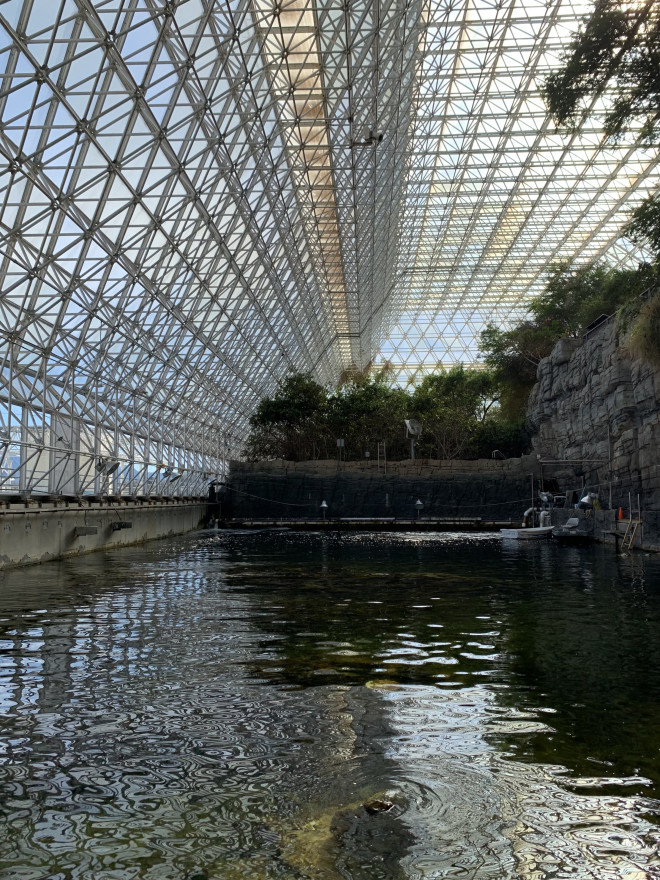
The 700,000-gallon model of the ocean sits inside Biosphere 2, a glass-enclosed research facility near Tucson, Arizona, where scientists carry out large-scale experiments (Photo by Hannah Johnson/El Inde).

The 700,000-gallon model of the ocean sits inside Biosphere 2, a glass-enclosed research facility near Tucson, Arizona, where scientists carry out large-scale experiments (Photo by Hannah Johnson/El Inde).
By Hannah Johnson
You’re standing on a beach, while gentle waves lap against the sand. If you look into the water, you can see hermit crabs munching away on algae. The smell of seawater wafts through your nose. Warm sunlight streams down, filtering through the geometric glass walls and ceiling. Outside, you can see the Sonoran Desert and the Santa Catalina Mountains in the distance.
You’re not standing at sea level but at an elevation of over 4,000 feet. You’re inside a former space colony experiment that’s now an Earth systems research center.
Welcome to the Biosphere 2 Ocean.
The University of Arizona’s Biosphere 2 is a unique facility where marine biologists, atmospheric scientists, biogeographers and other scientists conduct large-scale experiments. Katie Morgan, manager of Marine Systems at Biosphere 2, is currently preparing the Ocean for some new accessories. Morgan points out the $3 million worth of lights to hang over the surface, which she explains will be critical for helping corals grow under glass that blocks out UVA and UVB light.
Biosphere 2 has a long history of groundbreaking research in the public eye. The Biosphere 2 Ocean provides an opportunity for visitors to see marine science in action, no sea legs required. I was fortunate to have the opportunity to get a behind-the-scenes tour from Morgan. Here are 5 fascinating facts about the Biosphere 2 Ocean that are sure to amaze:
1. It’s the biggest research tank in the world, Morgan said. Filled with 2.6 million liters of saltwater, it’s just a tad bigger than an Olympic swimming pool. Unfortunately, Morgan explained that visitors are not allowed to swim in the Ocean, so Michael Phelps will need to find another place to practice. The Biosphere 2 Ocean mimics the shape of the ocean floor with a beach that drops off until a reef crest rises up to break the waves, followed by a drop down to a deeper ocean beyond.
2. The deeper end of the Ocean plunges 7 meters, or just over 21 feet—that’s deep enough to cliff-dive into. A tall cliff rises on the edge of the ocean, allowing a bird’s-eye view of the simulated sea. Assistant Research Professor Joost van Haren, who has worked at Biosphere 2 for decades, shared an anecdote about the lives of the original inhabitants of the facility. When Biosphere 2 was created as a prototype habitat for humans on Mars, the Biospherians who lived inside the experiment between 1991 and 1993 didn’t just do research all day. They were able to cliff-dive safely into the water. Talk about a fun lunch break!
3. So where did those 700,000 gallons of water come from? The original researchers knew that to create a true ocean system, they needed all the features of ocean water. These include minerals and microorganisms that turn saltwater into seawater. Rather than trying to replicate true ocean water, Morgan explained that the creators of Biosphere 2 decided to bring 100,000 gallons of seawater from San Diego to the facility, carried in milk trucks across the desert.
4. In the late ’90s, Columbia University conducted climate change experiments within Biosphere 2. According to Morgan, Columbia scientists knew that with rising carbon dioxide levels in the atmosphere would come rising acidity in the oceans. They wondered how high acidity would affect a coral reef system, so they raised the acidity of the Ocean to mimic a future atmospheric carbon dioxide concentration of 420 ppm. As a result, corals grew less and underwent a bleaching event, losing their colorful symbiotic algae and starving to death. With the data collected, the researchers predicted that future ocean acidification in the real ocean would cause a 40 percent decrease in coral growth between 1880 to 2065. This was one of the first studies on ocean acidification, a defining issue threatening oceans today.
5. Morgan is well aware that ocean acidification is not the only threat facing corals. Oceans absorb not only carbon dioxide, but also heat. This function is critical for the health of our planet: It is our oceans that keep air temperatures steady and livable. As global temperatures rise, oceans endure the brunt of it. High water temperatures are hard on corals. Morgan likened long heat waves in the ocean to human illness: “If you have a 102-degree fever for two days, you recover. If you have a fever for two weeks, you die.” Equipped with a heat exchange system, the Ocean can simulate these heat waves. Water run through the system is heated or cooled, and then returned to the research tank. According to Morgan, the entirety of the 700,000-gallon ocean can be moved through the heat exchange system in 24 hours, enabling groundbreaking research on how heat waves affect corals and what humans can do to save them.
––
With 50 international partners, the research team at the Biosphere 2 Ocean will continue doing critical work. Keep an eye out in the news for the iconic glass structure because there’s no doubt that Biosphere 2 is going to be making headlines again.